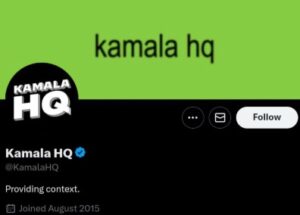
With the upcoming presidential elections this November, both democratic and republican party candidates, Kamala Harris and Donald Trump have been campaigning to the masses, and particularly the newest generation of voters, Gen Z. The generational hallmark of this demographic of voters is that they were raised in the new age of social media, and that is a defining aspect in Gen- Z culture. So, trying to appease to this demographic, both candidates took an approach of creating and posting content that is relatable and popular on social media.
This past summer, pop-singer Charli XCX released a new album, ‘brat.’ This album debuted on the Billboard Top 100 chart at No. 3, and turned into cultural phenomena on social media, users declaring it a “brat summer.” The album cover art was simple yet distinct, with a lime green background and the word “brat” centered in all lowercase. Gen Z made parodies of this cover art online, using the lime green background and writing in their own titles. This turned into a major social media trend and was extremely well received online as the album itself was slowly turning to be a defining album of the summer, her songs being heard everywhere: online, on the radio, in department stores, etc. But, the social media trend remained as only a part of meme culture on the internet.

This was until, Kamala Harris’ campaign tapped into the trend on her official Kamala HQ page on X, social media platform formerly known as Twitter. They made the banner on their profile the lime green background with the black lowercase font style, making it the first thing users would see when opening the page (the banner has now changed). This brings into question usage of intellectual property, as it is seemingly that Kamala HQ was not endorsed by Charli XCX prior to this campaign strategy. While the combination of the lime green background coupled with the brat font style falls into fair use and doesn’t have and copyright claims by the singer, it is still notable that while the trend took on a life of its own, it remains to have a clear connection to the singer and her album.
This raises important considerations regarding how far political campaigns can/ should go when borrowing from pop culture, because its hard to draw the line as to where inspiration turns into infringement, especially when dealing with recognizable intellectual property.
Since this, Charli XCX has publicly endorsed Kamala, but the question still remains: is intellectual property theft brat?








I thoroughly enjoyed reading this article as the election and the brat album are very prominent in present society. My opinions on Kamala using the same color and font as the brat album on Kamala HQ’s X account changed as I continued reading. At first, I thought that it was a very smart move for her campaign team to use, as most of Gen Z is obsessed with the album. I thought it showed that although we are of different age groups and generations, Kamala can still recognize “important” aspects of Gen Z culture and can still relate. As I kept reading, I started to disagree with her using the same logo as the “brat” album without being publicly endorsed by Charli XCX. In my opinion, it would have been extremely smart for her to wait to use the logo until she was endorsed by Charli herself, as it can look like she is just copying her or only using the logo to interest her Gen Z supporters. If she had waited, I think that the impact of using the logo would have been stronger, more ethical, and more inspirational.